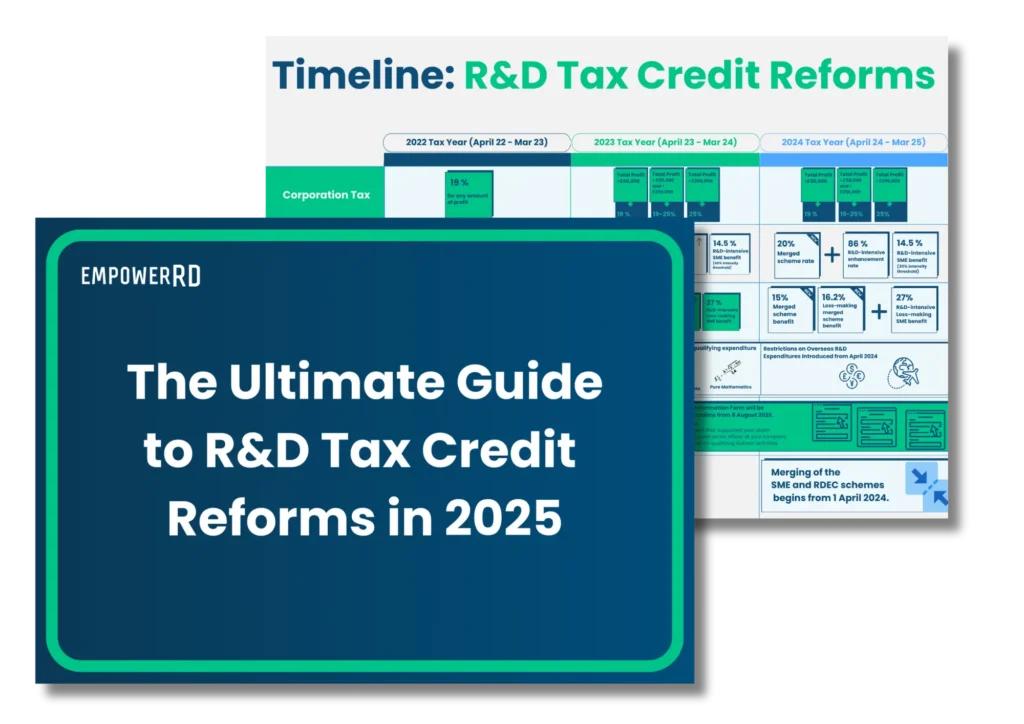Last week, HMRC published its Approach to Research and Development Tax Relief report on the same day as the Autumn Budget 2024. It has some interesting findings in it, which we thought you might find interesting.
Over the past few years, HMRC has been increasing compliance measures to reduce error and fraud to protect taxpayers’ money and make sure relief goes to innovative companies. While this has been effective, it puts extra pressure on businesses, especially SMEs where claims under £1m are now showing much lower compliance rates.
Some of these claims may be invalid but a large number of companies with valid claims have given up due to the cost and complexity of the enquiry process. At the latest RDCF meeting, HMRC recognised the need to improve the enquiry process and is making progress with more constructive engagement and openness when rejecting claims.
This underscores the importance of reassessing your claims process. Submitting a robust, well-documented claim is now more crucial than ever. For many SMEs, partnering with an R&D specialist who can navigate these heightened standards and provide enquiry support at no extra cost can make a significant difference.
Below we break down the key findings from the report, including the Mandatory Random Enquiry Programme (MREP2) and what it means for you.
Our Findings from the Mandatory Random Enquiry Programme (MREP2) and what it means for you
What is the Random Enquiry Programme?
The Mandatory Random Enquiry Programme (MREP) is an initiative by HMRC aimed at ensuring the accuracy and compliance of R&D tax relief claims. Through random selection and detailed examination of a representative sample of claims, MREP helps HMRC identify common errors, potential fraud, and misunderstandings of eligibility criteria. This information guides HMRC in enhancing compliance and developing targeted guidance for future claimants.
The Impact of the Stricter Compliance Rules
The Mandatory Random Enquiry Programme (MREP2), which reviewed R&D tax relief claims for the 2021-2022 tax year, showed significant variation in compliance rates by claim size. For claims over £1m, the compliance rate was 75% and for claims under £1m, it was 29-58%.
Part of this difference can be attributed to the unscrupulous R&D advisors who previously encouraged non-qualifying companies to make claims. Thankfully those organisatons are disappearing. But a large proportion of non-compliant cases are small, resource-poor companies who are being put under pressure to meet the new requirements but don’t have the resources to deal with the prolonged enquiries.
And on top of that the new Additional Information Form (AIF) and Claim Notification Form require more information. Rate changes, ERIS and increased scrutiny have added to the complexity for already stretched SMEs.
Compliance issues for experienced claimants
Interestingly, even experienced claimants have compliance issues, 24% of their claims were partially non-compliant. This shows that the compliance standards have changed for all claimants, not just first-timers. With the rapid changes in the scheme, now is a great time to review your R&D claims strategy and the quality of the R&D advisor you are working with.
When choosing an R&D advisor consider:
- Enquiry rate: A lower enquiry rate means a more thorough and compliant process. EmpowerRD for example has an enquiry rate of less than 5%.
- Claim quality team’s credentials: Look for advisors with tax and R&D expertise, former HMRC staff, PhD-level specialists or ATT-qualified professionals.
- Support with technical narratives: A good technical narrative is essential to clearly explain your R&D activities to HMRC. An advisor should have narrative draft writers to ensure your narrative meets HMRC’s guidelines.
A good advisor will make sure your claims are compliant and accurately reflect your R&D activities.
First-time and smaller claimants
The MREP2 findings also show that first-time claimants are the most vulnerable, 46% of their claims were fully non-compliant and 13% were partially non-compliant. Often this is due to misunderstanding or incomplete submissions.
For smaller companies, these technical requirements can be overwhelming. The level of detail required for the AIF is often beyond the level of expertise in-house. Working with an R&D advisor can be the key to navigating these challenges and ensuring claims are submitted accurately and to HMRC standards.
Sector-specific compliance
MREP2 data also shows compliance varies by sector. Accommodation and Catering had the lowest compliance rate at 16% and Manufacturing and Professional Services had the highest at 52% and 45% respectively. Accommodation and Catering isn’t a sector traditionally associated with technological or scientific advances, so it’s hardly surprising.
But if your business is in a sector not traditionally associated with R&D it’s still worth checking the eligibility criteria with a specialist. A good R&D advisor can help you determine if your activities qualify even in a non-traditional sector.
HMRC’s Role in protecting public funds
HMRC’s data shows that their compliance interventions are working. Only 10% of non-compliant cases show fraud indicators, most non-compliance is due to understandable administrative errors or misunderstandings. This has resulted in a reduction of the overall error and fraud rate to 7.8% in 2023-24 making the R&D tax relief scheme more robust for genuine innovators.
Again, the fact that most non-compliance is due to misunderstandings or administrative errors reaffirms the fact that specialist support is more important than ever. A good R&D advisor is submitting multiple claims a day and they know the scheme inside out.
Get in Touch
EmpowerRD has supported over 1200 innovators with their R&D Tax credits claims, our team of experts coupled with a next gen collaboration platform deliver compliant claims at one of the lowest enquiry rates in the industry. Get in touch today to find out how we can help your business get the most out of R&D tax relief and drive innovation.







